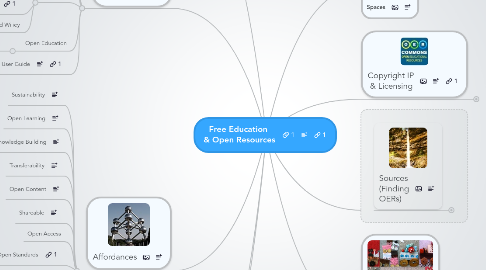
1. Reading, Study and Reflection
1.1. READING
1.1.1. Are all kinds of pedagogical styles that underpin OERs acceptable?
1.1.2. Innovating pedagogy (OU): important report on new l earning contexts
1.1.2.1. New pedagogy for e-books
1.1.2.2. Publisher led short courses
1.1.2.3. Assessment for Learning
1.1.2.4. Bedges to accredit learning
1.1.2.4.1. Mozilla Open Badges Project
1.1.2.5. MOOCs: Two pedagogical styles
1.1.2.5.1. Examples:a reading MOOC
1.1.2.6. Rebirth of academic publishing
1.1.2.7. Seamless learning
1.1.2.8. Learning Analytics
1.1.2.9. Personal Inquiry Learning
1.1.2.10. Rhizomatic learning
1.1.3. Reviews and reports
1.2. DEBATES
1.2.1. Debate - should OERs allow commercial Resuse
1.3. REFLECTION
1.3.1. OER Impact Study
1.3.2. Lorna's Blog
1.3.3. Oxford University - OER Impact Presentation Marion Manton JISC 2012
1.3.4. What Does Openness mean to Universities
1.3.5. EVOlLV_OER
1.3.6. OERs - Difference between Schools & Universities
1.4. #H187
1.4.1. Readings week 1
1.4.1.1. MWeller
1.4.1.2. Anderson AltC Keynote 2009
1.4.2. Readings Week 2
2. Definitions
2.1. UNESCO
2.2. Wikipedia Link
2.3. Open Content
2.4. UKOER Reports and Evaluations
2.5. Origins
2.5.1. Downes 2001
2.5.2. Unesco World Forum 2002
2.5.3. 2002 MIT OpenCourseware
2.5.4. David Wiliey
2.6. Open Education
2.6.1. Wikipedia
2.7. OER User Guide
3. Affordances
3.1. Sustainability
3.2. Open Learning
3.3. Knowledge Building
3.4. Transferability
3.5. Open Content
3.6. Shareable
3.7. Open Access
3.8. Open Standards
3.9. Metadata
3.9.1. CC
3.9.2. Geotags
3.10. Communities of Practice (Wenger) Anderson
3.11. Issues
4. Application
4.1. Online Course
4.1.1. DS106 - Digital Storytelling
4.1.2. MOOC
4.1.2.1. xMOOCs
4.1.2.2. cMOOC
4.1.2.3. JISC Definition
4.1.3. Local Courses within an Institution
4.1.4. MOOCs
4.1.4.1. Open Education
4.1.4.2. Edx
4.1.4.3. Coursera
4.1.4.3.1. University of Edinburgh
4.2. OER development comunities
4.2.1. OER Community - University of Bedforshire
4.2.2. WikiEducator
4.2.3. MedDev
4.2.4. OER AfricaShare
4.2.5. OERs In School
4.2.5.1. DEFT Project
4.2.5.2. New Zealand Schools
4.2.5.3. Walking the Walk
4.3. OERs In practice
4.3.1. Redwood College
4.3.2. OER (VLE Activity)
4.3.2.1. Group
4.3.2.2. Individual
4.4. Conferences
4.4.1. Un-Conferences / Meetups
4.4.1.1. MirandaMods
4.4.1.2. TeachMeets
4.4.2. Presentations
4.4.2.1. Slideshare
4.4.3. Live Connferencing
4.4.3.1. Hangouts On Air
4.4.3.2. Skype
4.4.3.3. Hangouts
4.5. Repositories
4.6. Course Design
4.7. Open Research (Weller 2012)
4.8. Assessement
4.8.1. Badges
4.8.2. Cerificates
4.9. Pedagogical Designs
4.9.1. Dial-E framework
5. Sign-up FREE to edit this map
6. Spaces
6.1. MOOC
6.1.1. Four Barriers to MOOCs
6.1.2. MOOCs: Advantages and disadvantages
6.1.3. Debate: MOOCS: neither the death of the university nor the panacea for learning
6.1.4. MOOC participant views
6.1.5. MOOC Backlash
6.1.6. MOOC: Presentation to EDUCAUSE's NGLC summer of learning series. George Siemens
6.1.7. Learning for Free? MOOCs
6.1.8. MOOC providers
6.1.8.1. P2P
6.2. Online Platform
6.2.1. Canvas
6.2.2. Moodle
6.2.2.1. Open spaces or closed doors
6.3. API
7. Copyright IP & Licensing
7.1. Creative Commons
7.1.1. Guidance / Advice / Courses
7.1.2. Licences
7.1.2.1. BY
7.1.2.2. BY SA
7.1.2.3. BY ND
7.1.2.4. BY NC SA
7.1.2.5. BY NC
7.1.2.6. BY NC SA ND
7.1.3. Categories
7.1.3.1. BY: Attribution this is a default in all CC licences - all CC licences must include an attribution to the creator of the resource.
7.1.3.2. SA If you share or use this work you must make it available under the same licence
7.1.3.3. NC No commercial Use of the work is allowed
7.1.3.4. ND No Derivatives. The original work must not be changed or edited.
7.1.4. Jurisdiction -Map of countries who subscribe to CC
7.1.5. CC Tools
7.1.5.1. CC Licence Selector
7.1.5.2. CC OER Tool
7.1.6. debate
7.1.6.1. Licence Restrictions
7.1.7. CC Timeline
7.2. Public Domain
7.3. © Copyright
7.4. Open Licences
8. Sources (Finding OERs)
8.1. Academia
8.1.1. Open Learn
8.1.2. University of Oxford
8.1.2.1. OpenSpires
8.2. Search and Discovery tools
8.2.1. Xpert
8.3. Sources
8.3.1. Wellcome Trust
8.3.1.1. Wellcome Images
8.3.1.2. Wellcome Library
8.3.2. Wiki Foundation
8.3.2.1. Wikipedia
8.3.2.2. WikiMedia Commons
8.3.2.3. Wikiversity
8.3.2.4. Wikieducator
8.3.3. Internet Archive
8.3.3.1. Prelinger
8.3.4. OER Commons
8.3.5. Flickr Commons
8.3.6. iTunes U
8.3.7. National Archives
8.3.7.1. Focus on Film
8.3.8. Library of Congress
8.3.9. Khan Academy
8.3.9.1. Smart History
8.3.9.2. Computer Science
8.3.10. Project Gutenberg
8.3.11. NASA/JPL
8.3.12. JORUM
8.3.12.1. Scottish Colleges
8.3.13. Europeanna
8.3.14. Video Platforms
8.3.14.1. YouTube
8.3.14.2. Vimeo
8.3.14.3. BlipTV
8.3.15. Rumsey Map Collection
8.4. Sharing OERs
8.4.1. OER Commons
9. Making
9.1. New Resources
9.1.1. Repurposing
9.1.2. Original
9.1.3. Remix
9.2. Audience
9.3. Purpose
9.4. Curation
9.5. Tools
9.5.1. iTunesU
9.5.2. Copyright toolkit
9.5.3. Open Source Tools
9.5.3.1. Freemind
9.5.4. Search
9.5.4.1. JISC Finding OERs Toolkit
9.6. Skills
9.6.1. Web Skills
9.6.1.1. Coding
9.6.1.1.1. Mozilla Popcorn
9.6.1.2. Searching
9.6.1.3. Presentation
9.6.2. Media Skills
9.6.2.1. Edtiing
9.6.2.1.1. Proprietary tools
9.6.2.1.2. Open tools
9.7. Media
9.7.1. Media Type
9.7.1.1. Images
9.7.1.1.1. Flickr CC
9.7.1.1.2. Compfight
9.7.1.2. Video
9.7.1.2.1. Platforms
9.7.1.2.2. Formats
9.7.1.3. Audio
9.7.1.4. Text
